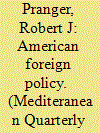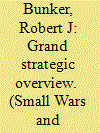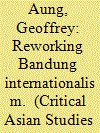|
|
|
Sort Order |
|
|
|
Items / Page
|
|
|
|
|
|
|
| Srl | Item |
| 1 |
ID:
087845


|
|
|
|
|
| Publication |
2009.
|
| Summary/Abstract |
A new American president will now confront the extraordinary complexity of his country's foreign policy. Presidents, even without foreign affairs backgrounds, have already formed ideas about basic directions that the nation's international policies should take, and it is these fundamental inclinations to which this essay addresses itself, an essay divided into four parts: (1) types of foreign policy, (2) some recent examples of presidential choices about direction, (3) future possibilities for a new administration that entered office in January 2009, and (4) limitations on the foreign policy choices of the new president-the old bugaboo of priorities.
|
|
|
|
|
|
|
|
|
|
|
|
|
|
|
|
| 2 |
ID:
175164


|
|
|
|
|
| Summary/Abstract |
Communities on the planet are faced with complex challenges: changing relations within and between human communities, changing relations with ecological and climatic conditions, and shifts in technology-human interconnections. The complex interconnections across issue areas – migration, environmental degradation and new technologies, for example – demand that scholars increasingly think across theories, paradigms, specialisms and disciplines. But how should we ‘hold things together’ as we try to make sense of complex realities in International Relations (IR)? This introductory article to the Special Issue ‘Facing human interconnections: thinking International Relations into the future’ discusses the open thematic of ‘human interconnections’ that is used to loosely structure the contributions. Analysis of human interconnections, as understood here, does not have a precise or fixed definition but is considered an open-ended notion with varied meanings and dimensions. Indeed, the authors engage it here in varied ways to explore their empirical, theoretical and political concerns. Yet, this notion also allows for interesting new questions to be posed on the potential and limits of IR as it faces the future, and debates around how we see interconnections between issue areas and ‘-isms’, how IR constructs ‘humans’ or ‘non-humans’ in interconnections, and what is at stake in bringing to our attention unacknowledged interconnections. Here we set out why human interconnection is an interesting notion to work with and why we need to keep its meaning open-ended. We also provide an account of six different orientations we observe amongst the authors tackling the dynamics of human interconnections in this Special Issue.
|
|
|
|
|
|
|
|
|
|
|
|
|
|
|
|
| 3 |
ID:
097501


|
|
|
|
|
| Publication |
2010.
|
| Summary/Abstract |
This note investigates price differentials between electricity forwards and portfolios of short-term futures with identical delivery periods at the Nordic Power Exchange (Nord Pool). Since both contracts are traded at the same exchange, there is no influence of, for example, different market microstructure and default risk when examining the effect of the marking-to-market of futures on the price differential. Although the prices of the futures portfolios are, on average, below the corresponding forward prices, these price differentials are, on average, not statistically significant and not economically significant when taking transaction costs into account. Given the characteristics of the electricity contracts under observation, this is consistent with the predictions of the Cox et al. (1981) model and indicates efficient pricing in the Nord Pool forward market in contrast to previous results.
|
|
|
|
|
|
|
|
|
|
|
|
|
|
|
|
| 4 |
ID:
108342


|
|
|
|
|
| Publication |
2011.
|
| Summary/Abstract |
This grand strategic overview highlights and analyzes the influence of epochal change on the state and conflict and the new realities with which the United States must now contend. This deep context is being provided so that (1) the belligerent and politicized non-state entities that have emerged in Mexico and the Americas can be better understood within the larger three-front grand strategic temporal conflict the US is now engaged in; and (2) the stark realities that the US faces - such as loss of unilateral world dominance, increasing debt and ongoing deficits, shifting demographics, inability to staunch the flow of and demand for illicit drugs, and an increasing prison population - are highlighted. Finally, this essay finishes with a discussion of the many important contributions contained in this edited work.
|
|
|
|
|
|
|
|
|
|
|
|
|
|
|
|
| 5 |
ID:
164683


|
|
|
|
|
| Summary/Abstract |
This commentary examines how futurity has been imagined across politics and political economy in Burma/Myanmar. Three areas are discussed: the revolutionary horizons of anti-colonialists, who combined Buddhist and Marxist ideas of historical progress; the developmental socialism of the early independence area, with its industrial telos and modernist commitments; and a contemporary development project in southern Myanmar, where processes of dispossession are troubling earlier temporal imaginaries. I suggest that a vision of postcolonial transformation coheres across anti-colonial and early independence claims to futurity. This temporal imaginary, which I call postcolonial futurism, promises transitions from farm to factory, peasant to the proletariat, and precapital to capital. This imaginary resonated widely. Today, however, scholars of South and Southeast Asia argue that modernist promises of transition now lack empirical and political purchase amid ongoing dispossession and trends towards low-wage, informal labour. Yet in the wake of postcolonial futurism, responses to dispossession are creating novel political possibilities. Responding to Kuan-Hsing Chen’s call to rework Bandung internationalism in the present, I consider how struggles over dispossession today indicate both openings and limits for the making of new political futures. Integrating Glen Coulthard’s work on colonialism and dispossession, I argue that decolonizing subjectivity is central to this process.
|
|
|
|
|
|
|
|
|
|
|
|
|
|
|
|
|
|
|
|
|